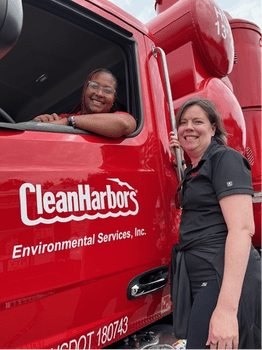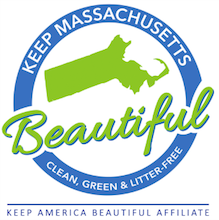
Following a recent community cleanup with Keep Massachusetts Beautiful Becky Underwood, President and EVP of Facilities at Clean Harbors, sat down with Donna Ayer, Vice President of Community Engagement and Public Affairs at Clean Harbors, to discuss the evolving role of the waste management industry in sustainability, the challenges facing the sector, and how individuals can make a difference in their own communities.
Question: The waste and recycling industry is critical in helping businesses and communities meet their sustainability goals. What do you think people often misunderstand about its role?
Becky Underwood: One of the biggest misconceptions is that waste management, particularly hazardous waste, is simply about disposal. In reality, it’s a highly sophisticated industry focused on environmental protection, resource recovery, reuse, recycling, and innovation. North America generates more than 350 million tons of industrial waste annually, and it’s our industry’s job to manage that to minimize environmental impact.
Take industrial and hazardous waste, for example. These materials require specialized treatment and processing to ensure they don’t contaminate water sources or harm ecosystems. Industry has made tremendous progress in advancing technologies that segregate the dangerous elements from the harmless ones so that we can recover valuable materials and lower greenhouse gas emissions. Our facilities don’t just handle waste, they safely and compliantly neutralize it, treat it or transform it into clean fuels, raw materials, and new products that drive a more circular economy.
Question: Fires started by lithium batteries and PFAS contamination are major concerns for communities. How is the industry addressing these challenges?
Becky Underwood: You’re right, these are two of many challenges that the industry is facing, and in response, the waste industry is investing heavily in offering solutions. With the rise in consumer electronics and electric vehicles, more lithium batteries and reactive materials are entering the waste stream. Improper disposal can lead to fires in trash bins, recycling facilities, and even landfills. That’s why safe collection programs and public education are so important. We're also seeing meaningful progress in e-waste recycling and improved battery recovery methods to reduce those risks.
PFAS contamination is a complex, long-term challenge that requires a collaborative effort across regulators, innovators, and the waste industry. I’m encouraged by momentum at the federal, state and local levels in terms of regulatory frameworks to confront a problem that has been decades in the making and is likely going to take many years to properly address. Clean Harbors, for example, recently partnered with the Department of Defense and EPA to test the safe destruction capabilities of our high-temperature permitted incinerators—and we achieved 99.999% destruction of various forms of PFAS at commercial scale. That’s a meaningful breakthrough for our industry, our customers, and the communities we serve. In concert with the EPA, we expect to publish the full results and findings of our most recent study in the coming months.
As regulations evolve, we’re working closely with municipalities and businesses to share best practices and ensure these “forever chemicals” are managed safely and responsibly.
Question: Technology and innovation are rapidly changing waste management. What advancements excite you the most?
Becky Underwood: There are several, but one of the most exciting areas is chemical/solvent recycling and clean fuels. Traditional recycling has limitations, but new chemical/distillation processes allow us to process materials and break them down even further into their base components, which can then be more readily reused in manufacturing. We're capturing waste byproducts—such as used oil or industrial solvents—and converting them back into clean lubricants or into alternative fuels that can power kilns, boilers, or industrial processes or supplying materials that can be used in applications from roofing to road construction. This circular economy approach and mindset not only reduces reliance on fossil fuels but also gives new life to materials that would otherwise be discarded. Clean fuel programs like these are a great example of how the industry is closing the loop and turning waste into a renewable energy resource that supports sustainability goals across sectors.
Another breakthrough is in AI and automation. Smart sorting technologies, robotics, and data analytics are helping us safely improve efficiency, and optimize facility operations. These innovations not only make waste processing more sustainable but also more cost-effective for businesses and communities.
Question: What are some practical steps individuals can take in their own homes and communities to contribute to sustainability?
Becky Underwood: First and foremost, proper disposal of household hazardous waste is key. Many people don’t realize that items such as batteries, paints, electronics, and chemicals should never go in regular trash or recycling bins. Most cities offer Household Hazardous Waste Collection Days, and I encourage everyone to find out when and where their local events take place. Sending those items to a solid waste landfill eliminates the potential for any recycling and creates the risk that those chemicals will be recirculated back into water supplies as they migrate from the solid waste landfill through leachate and run-off.
Another simple but impactful action is participating in local cleanup efforts. Getting involved in a neighborhood litter cleanup or waste reduction program can help people better understand how waste is managed and how small changes—like reducing consumption of single-use plastics or at-home food composting—can make a big difference. Here in Massachusetts, the Mass Save program organized by the utility companies promotes how even “one small thing” can make a big difference in energy savings and impact on the climate. That applies to waste as well.
Sustainability starts at home, and even small efforts can contribute to a larger, more responsible waste ecosystem.
Here are two ways you can get involved on a local level:
- Join the Massachusetts Litter Cleanup Crew
- Organize a Company Community Service Cleanup with your employer and co-workers


